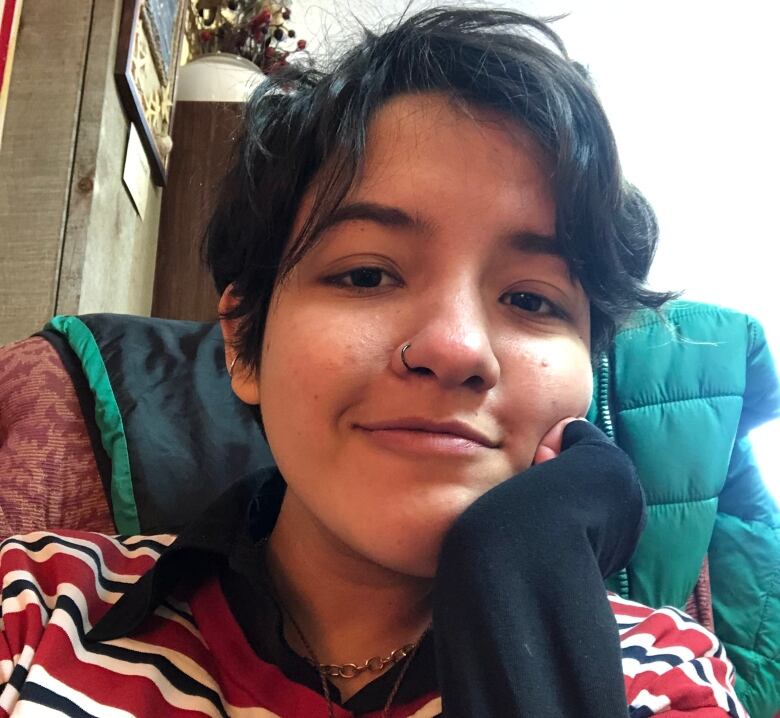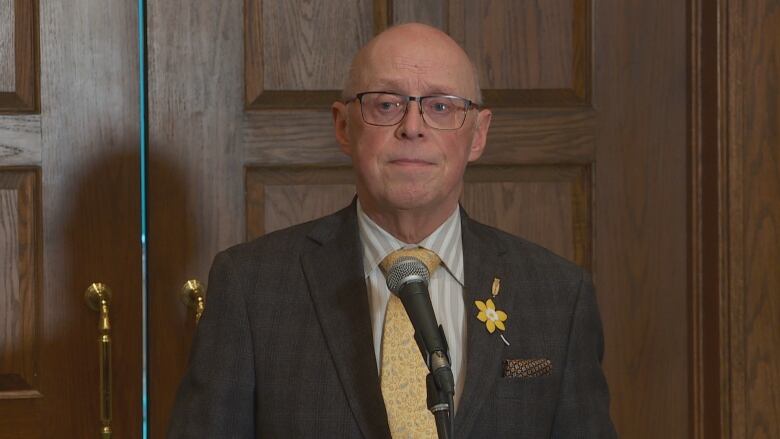Immigrants say they're forced to 'gamble' on health decisions without medical coverage
Systemic gaps exist in N.L. health-care coverage, says Anti-Racism Coalition

Immigrants to Newfoundland and Labrador say systemic barriers in the province's Medical Care Plan are putting the health and safety of the most vulnerable migrants at risk.
Domenica Lombeida, who uses they/them pronouns, is a migrant from Ecuador who came to Newfoundland and Labrador in 2017 for university. When they extended their studies due to the pandemic, they applied to extend MCP coverage too. They got rejected once because their study permit hadn't arrived, and again because they weren't a full-time student during the summer.
"That was just a very big, stressful time of my life," Lombeida toldCBC News.
During their time without coverage, Lombeida said,they were forced to pay $250 out of pocket for a blood test for their anemia a major expense for a student working part time. They were also removed from an outpatient wait-list following the expiration of their MCP.
"I've had to gamble a lot with my luck," Lombeida said.
"It's not like I can rely on my health to be, like, completely fine, you know? It's just hard," they said. "It's not like I can go back home and do [medical appointments] there, you know, because of the pandemic and everything else."
After a tearful phone call with MCP officers, Lombeida regained coverage once they resumed full-time studies. However, they've now graduated and a backlog in federal work permits means their MCP coverage will likely end again in June.
But Lombeida said their story is mild compared withother cases.
"People should be aware of how hard it is," they said. "I've heard, like, just awful, awful stories and awful complicated things."
Make MCP available for all, says Anti-Racism Coalition
The provincial government is offering MCP and prescription drug coverage to Ukrainians seeking refuge in Newfoundland and Labrador something it has not done for other migrants or refugees fleeing conflict.
The Anti-Racism Coalition of Newfoundland and Labrador has applauded the move, but called on Immigration Minister Gerry Byrne and Health Minister John Haggie to extend that coverage to all migrants.

Last week, Haggie said provincial health coverage is tied to federal visasand is consistent with other jurisdictions. He said the government is not aware of any systemic gaps in MCP coverage.
"There are individuals who, from time to time feel as though they've been missed out or or skipped over. I would suggest that 90 per cent of those are communication and paperwork issues, and we've resolved pretty well most of them," he said.
In a Twitter thread responding to Haggie's comments, ARC-NL noted that migrants can lose or be denied MCP coverage if their employment contract doesn't last for a year or more, if they don't find full-time employment within 90 days of finishing school, among other reasons.
"We have heard many stories of people avoiding health care due to cost, people with worsening health due to lack of access, and people fearing being reported to enforcement if they seek medical care," said ARC-NL.
We have heard many stories of people avoiding health care due to cost, people with worsening health due to lack of access, and people fearing being reported to enforcement if they seek medical care.
These are systemic issues that can be addressed. 4/7
—@antiracismNL'Equal opportunities'
Adi Khaitan, co-chair of the Newfoundland and Labrador chapter of Migrant Students United, said the organization hears from students who have chronic medical conditions but were unable to get support because they didn't have MCP coverage.
"They either end up paying extremely hefty bills or living in, like, constant struggle, constant pain, be it physical, emotional," said Khaitan, who came to St. John's from India in 2018.

Khaitan, who is non-binary, said they've looked into options for gender-affirming care like hormone replacement therapy, but they're worried about losing MCP coverage if they aren't able to find a full-time job within 90 days after graduation next year.
"It's like a rather ongoing sort of a vicious cycle where you might have MCP for a very short amount of time, you're able to get support, and then you're completely back to the lack of MCP," they said.
Khaitan said tying MCP coverage to work and student permits sends the wrong message to immigrants who may want to make Newfoundland and Labrador home.
"They only look at us in terms of bringing money to Canada, rather than actual people needing and deserving care, deserving equal care, equal opportunities, equal services."













_(720p).jpg)


 OFFICIAL HD MUSIC VIDEO.jpg)
.jpg)



























































































